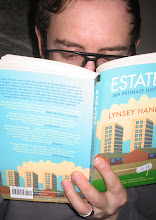Current read: Armageddon by Max Hastings
Where / how acquired: From Amazon, bought amidst Xmas presents for others
Vibe: Bellicose
I'm a member of CND, a big fan of and donator to groups like Campaign Against the Arms Trade and generally a most un-war admiring sort of person. Nonetheless, I read quite a bit of miitary history. I'm also a boringly predictable Guardian / Independent reading, New Statesman subscribing lefty - and yet I like Max Hastings, former editor of the Evening Standard and the Telegraph. Does that add up? Dunno...
Another read last year was Hastings' Nemisis, his grand history of the last months of the Second World War against the Japanese. It's painstaking, in every sense, but it was gripping. And so I've started the book which was the precursor, similarly exploring the end of the war in Europe. It's desparately unfashionable I know and reading it in the ICA cafe over a latte as i was this morning doesn't seem right. But, well, who cares.
Another recent read worthy of mention on these pages was Graham Swift's Shuttlecock, borrowed from my mother-in-law over the Xmas holiday. It's not unrelated to the above book, actually, featuring a protagnist haunted and daunted by what his decorated spy father did in the war. I've read Swift's Waterland (well, most of it - I confess I bailed out towards the end) and his much more friendly Last Orders. And I heard him talk, most sonorously, at last year's Cambridge Wordfest about his latest. I think his new book has a female protagonist but that aside his books share a theme of exploring masculinity in all it's weakness and failings - which isn't to say he is any sort of feminist or doesn't have anything good to say about men. Any thoughtful person born with the non-default one X chromosome ought to read him to get a particularly insightful, albeit complex, view of their sex. Shuttlecock, an earlier work, isn't perhaps his best, but I love it's unprentiousness way of disturbing in your mind all sorts of big issues (particularly, like i say, about being a man) without ever mentioning them explictly. There's lots in there about the dramas of work, too - often a subject that, despite it taking the bulk of most people's time on earth, not considered fit for fiction - and the seething passions and worries and motivations nestled under the surface of the most average and seemingly banal lives. I'll come to back to reading more Swift shortly I'm sure.
Oh, and I've finished Wildwood now - thanks to more than 10 hours spent on trains to and from Glasgow this week. it improves towards the end but it isn't a patch on Waterlog. Still definiately worth a read though.
